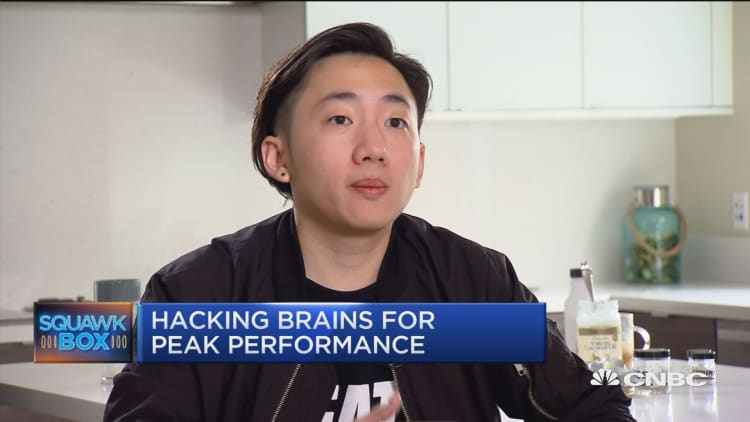
Every morning, while many Americans pour a bowl of cereal for breakfast, Aaron Ng reaches for a handful of supplements.
The 25-year-old product designer, who has worked at Square and Apple, takes multiple dietary supplements from a San Francisco–based start-up called Nootrobox. The capsules, which contain herbs like Bacopa monnieri, claim to enhance memory and stamina.
"I used to have really bad attention problems," Ng says. "I found that this has improved my attention dramatically. I can focus on problems that I used to get really easily distracted by. I think my memory is a lot better, too."
Ng isn't alone in his quest for improved cognitive performance.
In Silicon Valley, entrepreneurs, engineers and developers are trying to "hack" their brains and bodies with fasting, supplements and smart drugs called nootropics. The movement, known as biohacking, is an attempt to maximize peak mental and physical capabilities, with quantifiable results.
"People are looking to enhance their performance and what is biologically possible," says Nootrobox co-founder and CEO Geoffrey Woo, adding, "We are building a remote control for your brain."
Woo says his company, which sells products with names like Rise and Sprint, has "tens of thousands" of customers and will enjoy revenue growth this year of 300 percent. The start-up is also forging new partnerships. Starting on August 5, every 7-Eleven in San Francisco will sell Nootrobox's chewable caffeine cubes.
Nootropics, because they are supplements, do not require approval from the U.S. Food and Drug Administration. The topic, however, is generating a lot of attention from fans: The popular website Reddit now has more than 75,000 subscribers on its nootropics subreddit page.
Venture capitalists are also taking notice of this trend: The 17 companies targeting the brain with different products and solutions have now raised some $460 million from firms including Andreessen Horowitz and Khosla Ventures, according to CB Insights.
Dan Scholnick, a general partner at Trinity Ventures, is on the board of Bulletproof, which sells coffee blended with butter and triglyceride oil that claims to help consumers "perform better" and "think faster." Trinity wrote Bulletproof a check for $9 million.
"As an investor, I think the ideas and discoveries coming out of biohacking will change the world," says Scholnick, though he adds that companies concentrating in this market face a challenge in developing products that are easy for consumers to understand and use.
Beyond nootropics, tech workers also experiment with other forms of biohacking such as fasting. Woo says members of his team fast every week for 36 hours — some for 60 hours — which he says improves productivity. On the company's website, intermittent fasting is touted as benefiting longevity and improved insulin resistance.
Other entrepreneurs take biohacking to more extreme ends. One founder told CNBC that he uses Provigil, a drug designed for narcolepsy, to stay alert. Another 30-year-old founder relies on a daily dose of fish oil, coconut oil and vegetarian capsules called Neuro-Mag, which purportedly strengthen memory.
Despite its growing popularity, this movement does have its critics.
Dr. Candy Tsourounis, a professor of clinical pharmacy at the University of California, San Francisco, argues that there is no evidence supporting the claims of these start-ups.
"There are no randomized, controlled trials in human beings that show that these nootropics have any benefits above and beyond what we would see if someone were to follow a healthy diet and maintain regular exercise," Dr. Tsourounis says, adding, "You should always talk to your doctor or health-care provider before starting any supplement or any medicine."
Woo counters that Maastricht University in the Netherlands is currently conducting a clinical trial studying his company's supplements, which will publish at ClinicalTrials.gov.
Still, regardless of such skepticism, it's a safe bet that start-ups will continue targeting the dietary-supplement industry given the size and scale of this market: It's worth some $40 billion a year, according to the FDA.
— Lauren Thomas contributed to this report.


